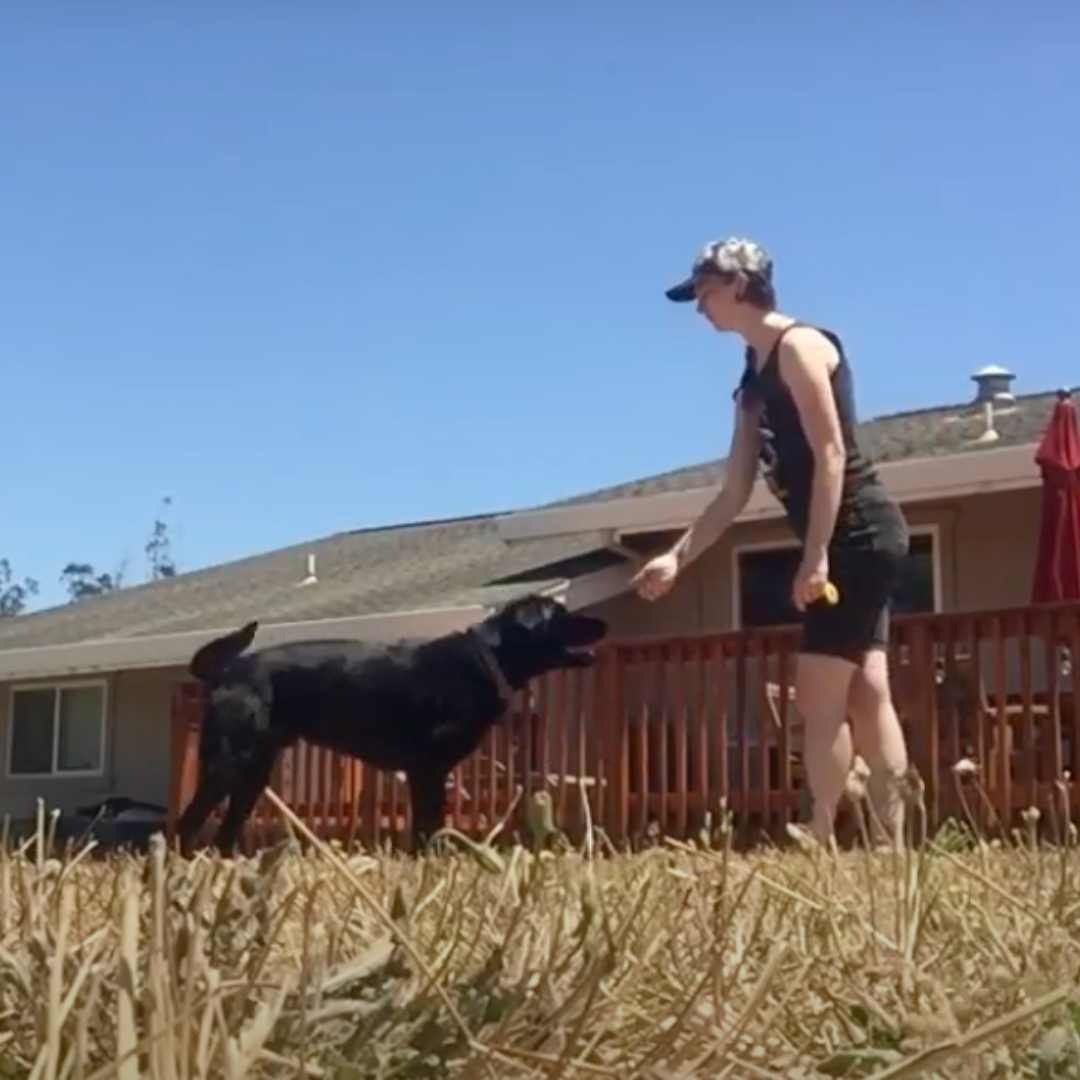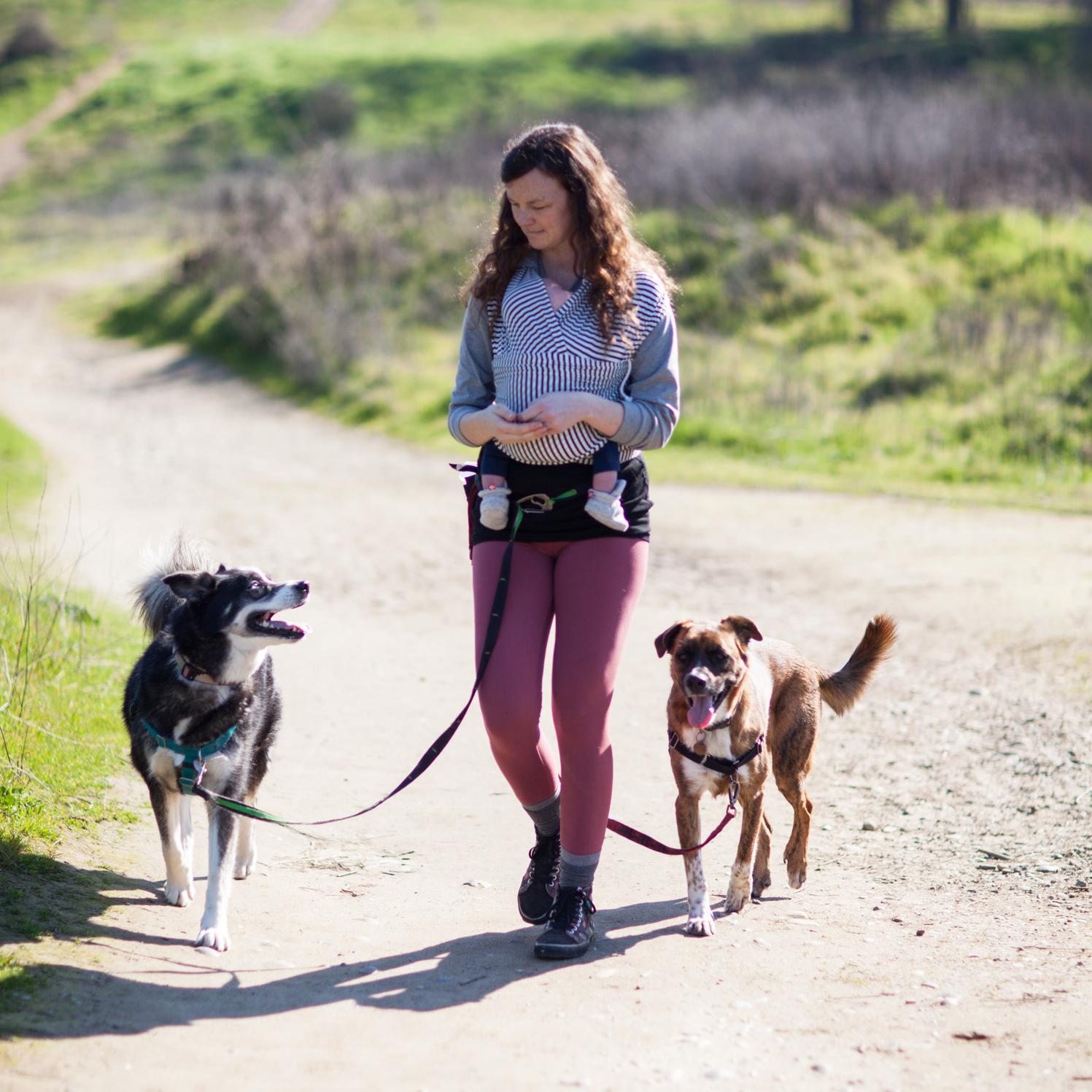Is your dog barking to get something he or she wants - attention, a door opened, a ball thrown, food, you name it? That's demand barking!
Most dogs practice demand barking at least occasionally (some almost incessantly) so it's worth diving in to understand demand barking and what to do about stopping demand barking.
Demand barking is fairly straightforward - it's when a dog barks to get something he or she wants. It's usually done in an excited, jumpy manner and accompanied by other dog body language such as pawing, jumping or spinning around the person they're demanding from.
It can be annoying and hard to deal with but there are steps you can take to help stop demand barking.
Your Dog's Plan
Stop! Don't read this long article. Instead, get everything you need to know, including all advice on Demand Barking, in a customizable step-by-step plan for your dog created by our community of certified trainers and nutritionists.
Why demand barking is so common
Demand barking is one of the more common vocalizations for dogs and frustrations for dog owners, and one of the more challenging types of dog barking to manage. This is largely because demand barking can be pretty easily and accidentally reinforced.
It's not uncommon for dog owners to give in to unwanted behavior like demand barking because it is easier than dealing with the noise. The barking is annoying, we want our dog to stop barking, so it's natural for a dog owner to give their dog what they want.
While this may seem like a small victory, it sends the wrong message and can actually make dog barking worse in the long run. Next time your dog wants something and you give it to him/her to make your dog's barking stop, you better believe you're going to have a barking dog again!
Prevention is your first, best solution to stop barking
This is definitely a situation where an ounce of prevention is worth a pound of cure - it's so much easier to stop demand barking by preventing it before it develops into a habit.
To prevent demand barking, just be mindful about how your dog is vocalizing to make requests. One way you can interrupt the beginnings of demand barking is simply to ask for a few other behaviors before you give your dog what she/he is asking for.
Try this
Let's say your dog barks with a little impatient bark when you pick up her/his ball ...
- Ask for a hand touch, to spin, and then to lie down.
- THEN throw the ball. This helps break up the association between dog bark = ball thrown.
However, be careful not to fall into another predictable pattern, otherwise your dog's barking will become a part of a behavior chain. Your dog may learn that she/he needs to bark, then do a hand touch, then spin, then lie down in order to get the ball thrown.
If it’s unpredictable, then it’s easier to erase the bark portion of that chain, so mix up the different behaviors in your sequence.
Interested in Demand Barking? Follow topics you're interested in to customize your dog’s step-by-step plan so it's most helpful and tailored to your dog when you're ready to get started.Demand Barking
Can excitement/anticipation barking morph into demand barking?
Yes, demand barking is honestly quite similar to excitement/anticipation/play barking. I would speculate that in many cases, barking out of excitement often turns into demand barking - our dogs begin barking in anticipation of something desirable, the desirable thing happens, and they begin to think they must bark in order for that thing to happen.
The method of eliminating the barking is also essentially the same - eliminate the opportunity for the barking to happen, and begin strongly reinforcing an alternative behavior before your dog starts barking. You always want to stop barking by preempting it when you can.
Trouble-shooting/retraining a long-reinforced demand bark
In the accompanying video below, you can see me working with a dog named Rocky. Rocky was seven years old when I started working with him, so he had years of reinforcement history for barking at a shrill, ear-splitting volume when playing fetch.
The old barking pattern (that we want to correct) looked like this:
- Toy appears
- Rocky starts barking
- Toy is thrown
- Rocky chases toy and catches it, brings it back and...
- Immediately starts barking
- Toy is thrown
The toy being thrown was clearly reinforcing the barking behavior. However, this is a high strung dog with a BIG ENERGY and YEARS of the dog's behavior being reinforced for this.
How to rewire a formerly reinforced demand bark
(using Rocky as an example)
Try this
- If I just stopped throwing the toy and waited for silence, he would escalate the barking behavior and become more and more stressed out (plus I’d have to endure that high-pitched bark for far too long).
- So instead, I began clicking and treating him as fast as I could for standing in front of me in silence. I really had to break this down for Rocky.
- Initially I had to click/treat him rapid fire as soon as he returned, as I picked up the toy, right until I threw it. Now not only was I reinforcing his stand in silence behavior with food, but the toy being thrown was also reinforcing his silence.
Need more advice? Browse all guides in the Barking Channel on topics like Understanding Barking, Fear Barking, Demand Barking, Alert Barking, and Excitement Barking - created by our community of certified experts for you and your dog.Barking
Explaining my training steps
In this video, I am working on slowing down my rate of reinforcement, and pausing for a few seconds between clicks, but at the beginning, my rate of reinforcement was much faster. However there were occasions on which I was able to fade the food and use the toy as the sole reinforcer.
In those cases, when he would occasionally slip up and start barking, I would set the toy back down and walk a few paces away. He would pick it up back up and bring it to me, and this “reset” was a chance for him to try again.
I only did this after he had started building a reinforcement history for silence. This was also information for me that I was asking too much of him in terms of duration, so I would speed it up the next time. If he made multiple errors, then I knew I needed to break it back down and go back to using food for a bit in our training session.
Is boredom the reason your dog is barking?
Another thing to think about when it comes to demand barking, is whether your dog's needs are being met. If your dog is demanding attention out of boredom, it’s worthwhile to consider adding more enrichment and activities to his or her day.
Some dogs need more activity every day than other dogs. As always, it helps to know your dog - observe your dog and watch for patterns of boredom/demand barking and activity levels. If your dog's mental stimulation and physical exercise needs are being met, your pup is more likely to be relaxed and less inclined to fall into boredom barking/demand barking.
Learn how to handle demand barking effectively. Discover why dogs engage in this behavior and how to prevent or stop it.
Choose how you'd like to view this guide's video.

Next up in the Barking Channel on Dogly
Now that you know how to manage your dog's demand barking, learn what to do if your dog alert barks, excitement barks, or fear barks in the other guides in the Barking Channel here on Dogly.
If you have any questions about demand barking and your dog, just ask in our Community Discussion. And continue in our Barking Channel where you'll learn everything you and your dog need to know about barking from our community of Dogly Training Advocates (each one a certified professional dog trainer like me)!
Or if you ever need more personalized dog training guidance, please reach out!

